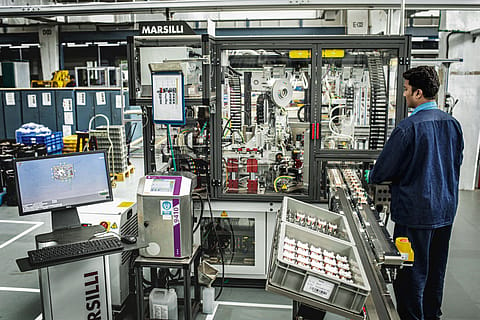Embrace 4th industrial revolution responsibly
We have to think about ways to share innovations with the rest of the world so that developing nations can also benefit and bolster their economies.

Over the past decade, technology has made remarkable advancements in speed, connectivity, and the increasingly powerful exchange of data, enabling the Internet of Things (IoT) that continues to transform our world. However, as we embark on the Fourth Industrial Revolution and embrace the explosive growth of the digital economy, we must do so in a responsible manner that not only lessens the global economic inequality but also ensures equitable and inclusive growth. Also, distribution of economic prosperity globally in a way it is not restricted to the biggest economies of the world. It is also imperative today to apply ethical thinking to the use of modern technologies. Introducing the ethical lens will help enterprises in “responsible” sustainable growth.
What we have all learned during the past two years of suffering and acclimatising our lives through a global pandemic is how interconnected we are as human beings. What happens in one region of the world cannot be isolated as Covid-19 has shown us. Country goals today are enabled by enterprises that are interconnected not only by physical presence in different countries, but also by technologies.
The world is a global village
We will be helpless if nations across the world would attempt to face challenges alone and not together. It is imperative that first world countries share their resources, knowledge, and technology to uplift even the smallest economies. The rising disparities among the haves and have nots are so evident in today’s world that they cannot be ignored. As wealthier countries continue to make enormous strides in technological advancements (incredible rise of telemedicine, remote working and learning environments, drones, 3D printers, self-driving vehicles, etc.), we have to think about how we can share all these innovations with the rest of the world so that developing nations can also benefit and bolster their economies.
Would it not be wonderful if a doctor in the U.S. can provide telemedicine services so a robotic operation could be performed in a village in Peru, or artificial intelligence (AI) can determine a health diagnosis for a cancer patient in Thailand, or real-time monitoring technology can be accessed at a hospital in Ethiopia?
Even more pertinent today is producing and making accessible Covid-19 vaccines to the global population to stop the spread of a disease that has killed more than 14.9 million worldwide. There is no better example of why, as we embrace these monumental advancements in technology, we must ensure we share in the prosperity of our innovations to improve the lives of the global population.
The Fourth Industrial Revolution was coined in 2016 by Klaus Schwab, the founder and executive chairman of the World Economic Forum. He imagined an industrial change in multiple technologies such as machine learning, AI, and genome-editing that blurred the lines between digital, physical, and biological worlds. Remarkably, over the past few years, we’ve seen his predictions become, in many ways, a reality for us.
Innovation is quintessential for evolving economies
Innovation has bolstered the rise of a digital economy that has enveloped our lives from online shopping to ordering food to transporting ourselves from one location to another. With IoT services so embedded in our daily lives, we foresee innovational technological solutions being at the core of everything we do. For instance, we can look towards a future that is fueling the rise of 6G technology. With 6G, we can expect even more powerful iterations of what can be possible.
Technology will continue to be an enabler. Technology has become an integral part of our lives and with the help of new-age technologies like 6G technology, we can expect machines performing complex tasks such as a tele-surgery in real time, or machines operating a drone or an aircraft. That’s a huge leap forward from data traveling from one point to another. With 6G technology, traffic will also be internal to the network, reducing transmission time, and taking advantage of predictive machine capabilities by anticipating required data needs and co-locating it to reduce lag.
6G technology can also help us in making fully remote services the new routine for many countries that currently lack access to adequate health services, education, farming, and transportation. This will eliminate time constraints, ensure efficiency, and would enable remote monitoring of every activity, from medical procedures, to livestock, and roads. Remote services will be a hallmark of 6G technology and will open up a new standard in services and care for people around the world.
(INR CR)
Today, as we all embrace the new normal, it is crucial to acknowledge that everything is interdependent! What Covid-19 has shown us is that even with all the technological advancements we have made, we are all vulnerable if we do not work together to lessen the economic disparities and share to transform the world. We may be far off from leveling the playing field, however, what we must do is take the first step, so people have a chance for survival and access to the basic needs that first world countries take for granted: food and clean water, education, medical services, and the ability to provide for families.
While we have witnessed enormous human development over the years, it’s crucial to maintain the pace while making consistent efforts in the same direction. Technology, with all its robust and powerful glory, should be enabled for that purpose. For that to happen, we must make every effort to share our innovations. In our ever-connected world, when that happens, we enrich the lives of the global population. With that in mind, we can embrace the Fourth Industrial Revolution responsibly and compassionately.
The author is managing director and chief executive officer at Tech Mahindra.